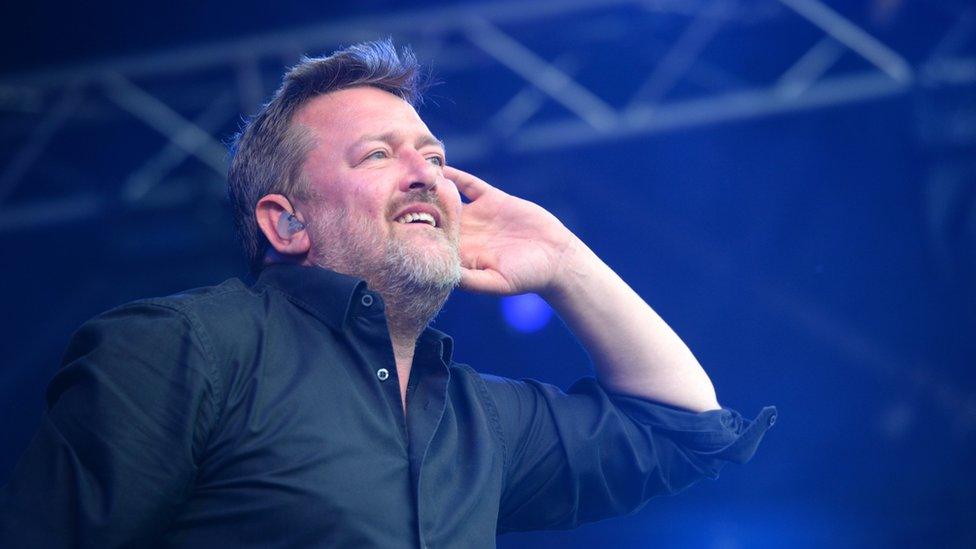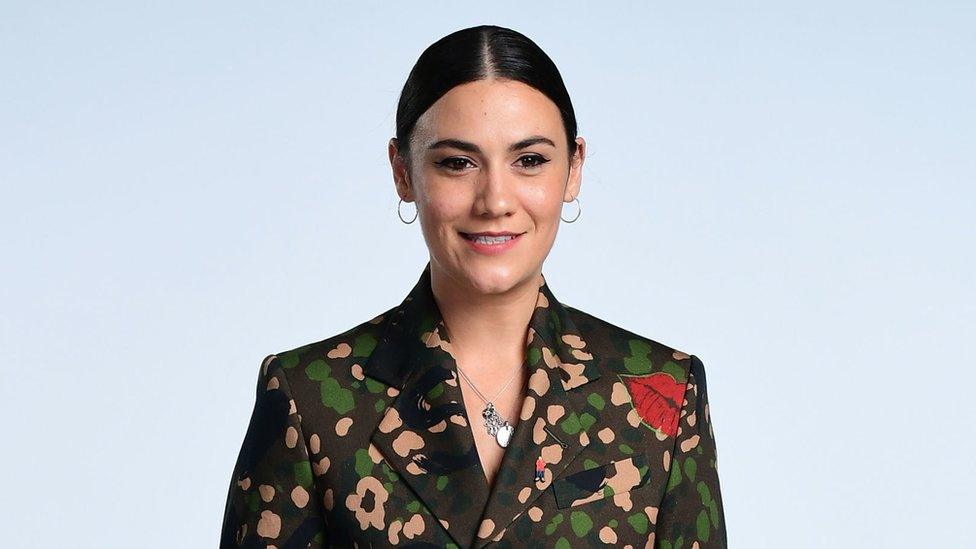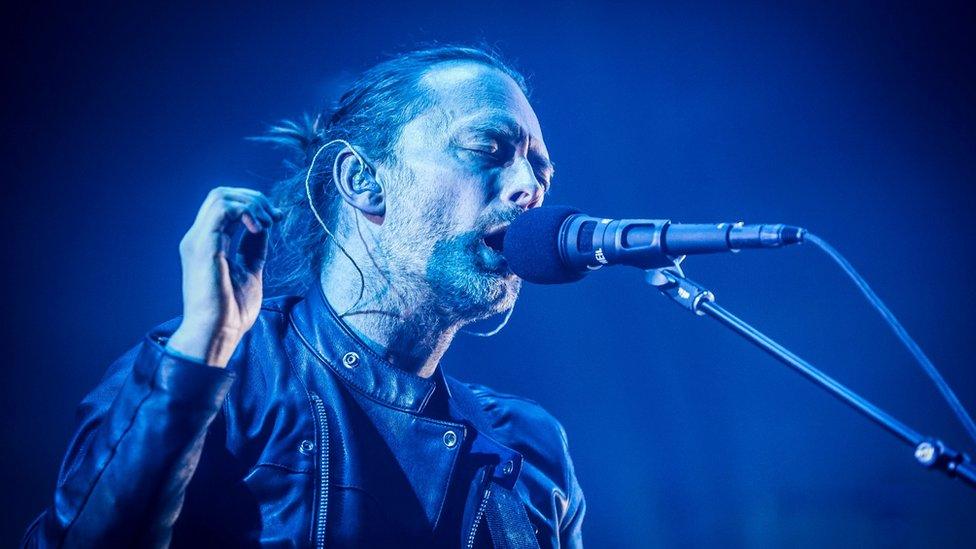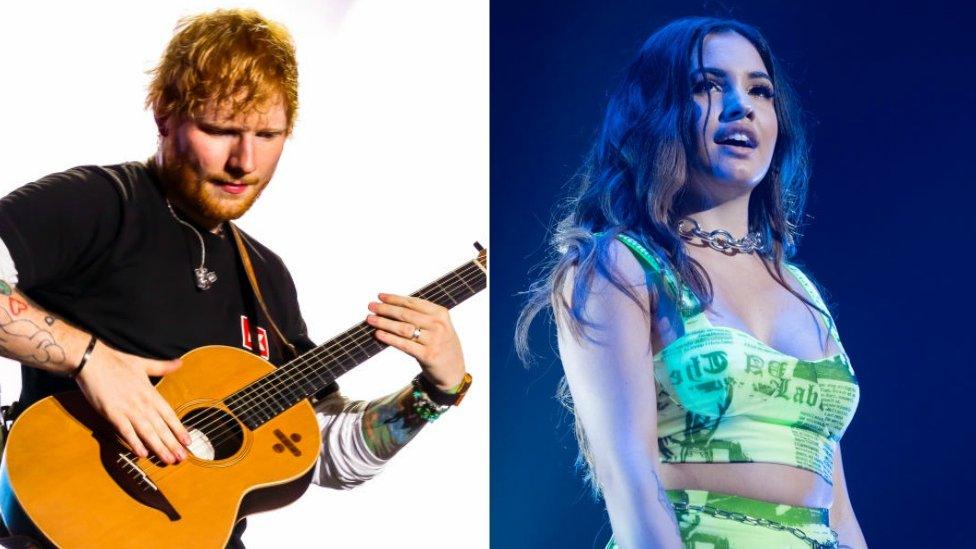Streaming payments 'threaten the future of music,' says Elbow's Guy Garvey
- Published

Elbow frontman Guy Garvey says the way artists are paid for audio streams is "threatening the future of music".
"That sounds very dramatic," he told MPs, "but if musicians can't afford to pay the rent... we haven't got tomorrow's music in place."
The musician was giving evidence to a DCMS Committee inquiry into the streaming music market.
MPs heard the coronavirus crisis had made it apparent that artists' earnings from streaming are "pretty horrific".
"Young musicians who rely on live income are really going to struggle," said Radiohead's guitarist, Ed O' Brien.
His comments were backed up by Mercury-nominated musician Nadine Shah, who said "earnings from my streaming are not significant enough to keep the wolf away from the door".
Shah said she was speaking on behalf of "many fellow musicians", who were afraid to speak out "because we do not want to lose favour with the streaming platforms and the major labels".
Young musicians are "afraid", agreed Tom Gray, from the rock band Gomez. "They're worried that if they speak, they won't be playlisted."

Nadine Shah's latest album, Kitchen Sink, has been named one of the records of the year by BBC 6 Music
The inquiry came after the Covid-19 pandemic wiped out a year of touring income, focusing artists' attention on the money they made from their records.
At the start of the lockdown, the Musicians' Union and Ivors Academy launched the Keep Music Alive campaign, calling streaming royalties "woefully insufficient" and urging the Government to undertake a review.
It runs in parallel with an online campaign called #BrokenRecord, founded by Gray, which seeks to address inequities in how streaming profits are shared between record labels, musicians and the streaming services themselves.
Allow X content?
This article contains content provided by X. We ask for your permission before anything is loaded, as they may be using cookies and other technologies. You may want to read X’s cookie policy, external and privacy policy, external before accepting. To view this content choose ‘accept and continue’.

Addressing MPs, Gray acknowledged that the exploitation of artists was a story as old as the music industry itself, but said streaming had "made the problem worse and more profound".
'Taken advantage of'
At present, Spotify is believed to pay between £0.002 and £0.0038 per stream, while Apple Music pays about £0.0059. YouTube pays the least - about £0.00052 (or 0.05 pence) per stream.
All of that money goes to rights-holders, a blanket term that covers everything from massive record companies to artists who release their own music. That money is then divided up between everyone involved in making the record.
Often, the recording artist will only receive about 13% of the revenue, with labels and publishers keeping the rest.
Explaining the discrepancy, Gray told MPs that many musicians are tied to archaic contracts, formulated in the era of cassettes and CDs, that do not reflect the realities of the 21st Century music business.
For example, he said, "major label deals still have clauses in them for physical breakages" - meaning 10% of an artist's royalties are automatically deducted to cover the cost of damaged vinyl and CDs, even when the majority of music is being played online.
Tom Frederikse, a solicitor and former producer, who also gave evidence, said in some cases the damage clause was as high as 25%.
Independent labels tend to make more equitable deals, Gray added, with some offering a 50/50 split of the profits.

Radiohead have fared well on streaming, but argue that lower-profile artists are being excluded
O'Brien acknowledged Radiohead had earned millions from their music - but said he was speaking up on behalf of less fortunate artists.
"The inherent problem we have as musicians is we love what we do. It's like therapy. I had years of depression and I kept my head above water because I'm in this band with my brothers.
"I would do this for free," he added, "and that's precisely what's been taken advantage of".
Most of the musicians were careful to praise streaming services - saying they used them to discover new music and reach new audiences - but asked the government to ensure a more equitable distribution of revenues.
"I'm not here to argue for Paul McCartney to get more money," said Gray. Instead, he noted that the world's three biggest record labels, none of which are based in the UK, were currently enjoying "the best profit margins they have ever made in their history".
"If we rebalance this, money goes into the UK economy," he said. "It seems like a bit of a no-brainer. We need to protect our talent pipeline."
The inquiry continues and will hear the "perspectives of industry experts, artists and record labels as well as streaming platforms themselves".

Follow us on Facebook, external, or on Twitter @BBCNewsEnts, external. If you have a story suggestion email entertainment.news@bbc.co.uk, external.
- Published14 May 2020

- Published15 October 2020
